Analyzing Ethical and Legal Considerations in Nursing Care - NUR09722
VerifiedAdded on 2022/08/29
|12
|3191
|16
Project
AI Summary
This assignment explores the significance of ethical and legal considerations in nursing care delivery, with a focus on a scenario involving a patient, Mr. S, who requests confidentiality regarding his medical condition. The project delves into the ethical dilemma arising from balancing patient autonomy, beneficence, non-maleficence, and justice, alongside legal frameworks such as the Personal Data Protection Act and the Human Rights Act. The assignment analyzes the ethical principles of virtue, deontology, and utilitarianism, examining how they apply to the situation and influence decision-making. The core issue revolves around whether the nurse should respect the patient's wish for confidentiality, potentially compromising his well-being, or disclose information to family and employers to ensure his physical, mental, and financial support. The project emphasizes the importance of respecting patient autonomy while navigating the complexities of providing holistic care within legal and ethical boundaries. The analysis concludes that, while beneficence is important, the nurse must prioritize the patient's autonomy and confidentiality based on the ethical and legal frameworks.
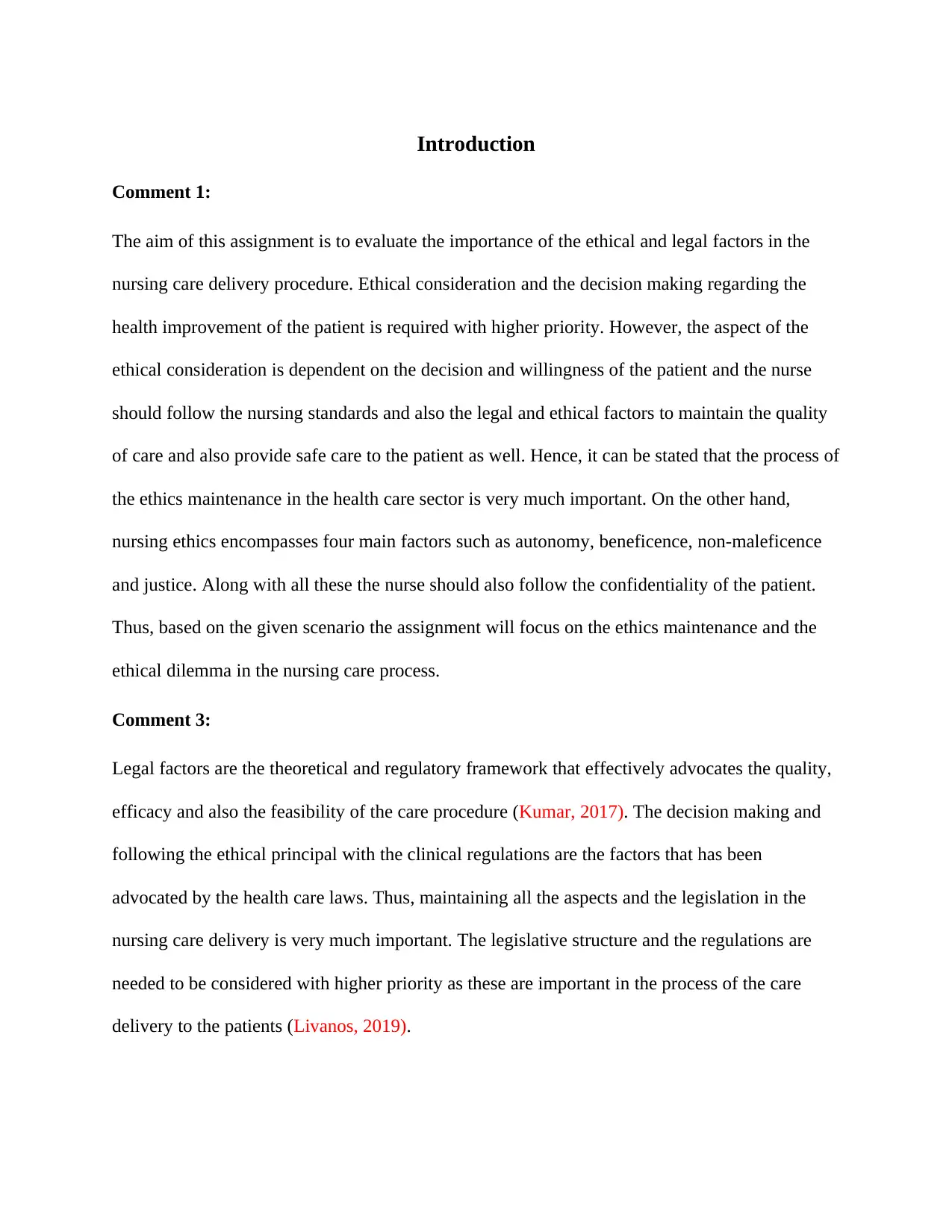
Introduction
Comment 1:
The aim of this assignment is to evaluate the importance of the ethical and legal factors in the
nursing care delivery procedure. Ethical consideration and the decision making regarding the
health improvement of the patient is required with higher priority. However, the aspect of the
ethical consideration is dependent on the decision and willingness of the patient and the nurse
should follow the nursing standards and also the legal and ethical factors to maintain the quality
of care and also provide safe care to the patient as well. Hence, it can be stated that the process of
the ethics maintenance in the health care sector is very much important. On the other hand,
nursing ethics encompasses four main factors such as autonomy, beneficence, non-maleficence
and justice. Along with all these the nurse should also follow the confidentiality of the patient.
Thus, based on the given scenario the assignment will focus on the ethics maintenance and the
ethical dilemma in the nursing care process.
Comment 3:
Legal factors are the theoretical and regulatory framework that effectively advocates the quality,
efficacy and also the feasibility of the care procedure (Kumar, 2017). The decision making and
following the ethical principal with the clinical regulations are the factors that has been
advocated by the health care laws. Thus, maintaining all the aspects and the legislation in the
nursing care delivery is very much important. The legislative structure and the regulations are
needed to be considered with higher priority as these are important in the process of the care
delivery to the patients (Livanos, 2019).
Comment 1:
The aim of this assignment is to evaluate the importance of the ethical and legal factors in the
nursing care delivery procedure. Ethical consideration and the decision making regarding the
health improvement of the patient is required with higher priority. However, the aspect of the
ethical consideration is dependent on the decision and willingness of the patient and the nurse
should follow the nursing standards and also the legal and ethical factors to maintain the quality
of care and also provide safe care to the patient as well. Hence, it can be stated that the process of
the ethics maintenance in the health care sector is very much important. On the other hand,
nursing ethics encompasses four main factors such as autonomy, beneficence, non-maleficence
and justice. Along with all these the nurse should also follow the confidentiality of the patient.
Thus, based on the given scenario the assignment will focus on the ethics maintenance and the
ethical dilemma in the nursing care process.
Comment 3:
Legal factors are the theoretical and regulatory framework that effectively advocates the quality,
efficacy and also the feasibility of the care procedure (Kumar, 2017). The decision making and
following the ethical principal with the clinical regulations are the factors that has been
advocated by the health care laws. Thus, maintaining all the aspects and the legislation in the
nursing care delivery is very much important. The legislative structure and the regulations are
needed to be considered with higher priority as these are important in the process of the care
delivery to the patients (Livanos, 2019).
Paraphrase This Document
Need a fresh take? Get an instant paraphrase of this document with our AI Paraphraser
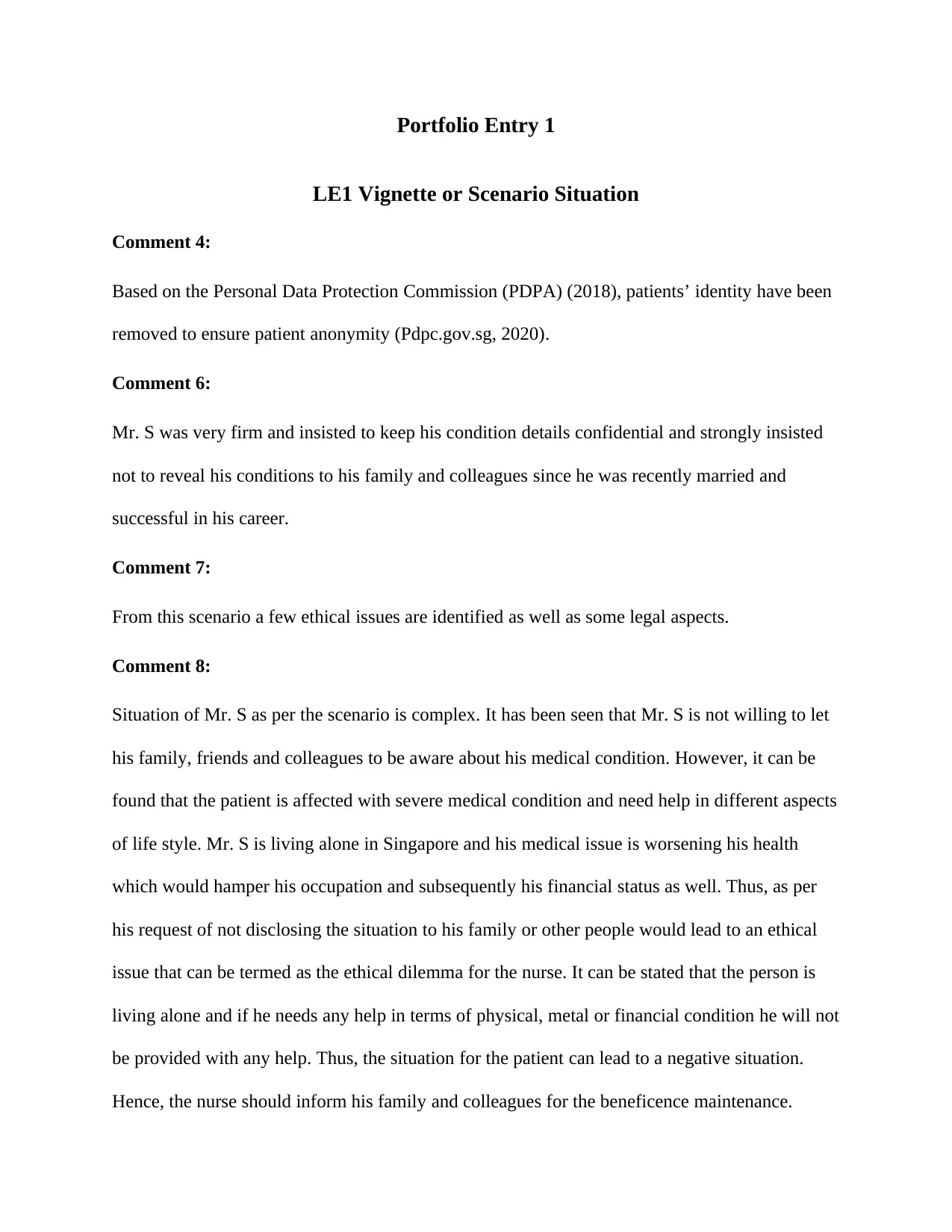
Portfolio Entry 1
LE1 Vignette or Scenario Situation
Comment 4:
Based on the Personal Data Protection Commission (PDPA) (2018), patients’ identity have been
removed to ensure patient anonymity (Pdpc.gov.sg, 2020).
Comment 6:
Mr. S was very firm and insisted to keep his condition details confidential and strongly insisted
not to reveal his conditions to his family and colleagues since he was recently married and
successful in his career.
Comment 7:
From this scenario a few ethical issues are identified as well as some legal aspects.
Comment 8:
Situation of Mr. S as per the scenario is complex. It has been seen that Mr. S is not willing to let
his family, friends and colleagues to be aware about his medical condition. However, it can be
found that the patient is affected with severe medical condition and need help in different aspects
of life style. Mr. S is living alone in Singapore and his medical issue is worsening his health
which would hamper his occupation and subsequently his financial status as well. Thus, as per
his request of not disclosing the situation to his family or other people would lead to an ethical
issue that can be termed as the ethical dilemma for the nurse. It can be stated that the person is
living alone and if he needs any help in terms of physical, metal or financial condition he will not
be provided with any help. Thus, the situation for the patient can lead to a negative situation.
Hence, the nurse should inform his family and colleagues for the beneficence maintenance.
LE1 Vignette or Scenario Situation
Comment 4:
Based on the Personal Data Protection Commission (PDPA) (2018), patients’ identity have been
removed to ensure patient anonymity (Pdpc.gov.sg, 2020).
Comment 6:
Mr. S was very firm and insisted to keep his condition details confidential and strongly insisted
not to reveal his conditions to his family and colleagues since he was recently married and
successful in his career.
Comment 7:
From this scenario a few ethical issues are identified as well as some legal aspects.
Comment 8:
Situation of Mr. S as per the scenario is complex. It has been seen that Mr. S is not willing to let
his family, friends and colleagues to be aware about his medical condition. However, it can be
found that the patient is affected with severe medical condition and need help in different aspects
of life style. Mr. S is living alone in Singapore and his medical issue is worsening his health
which would hamper his occupation and subsequently his financial status as well. Thus, as per
his request of not disclosing the situation to his family or other people would lead to an ethical
issue that can be termed as the ethical dilemma for the nurse. It can be stated that the person is
living alone and if he needs any help in terms of physical, metal or financial condition he will not
be provided with any help. Thus, the situation for the patient can lead to a negative situation.
Hence, the nurse should inform his family and colleagues for the beneficence maintenance.
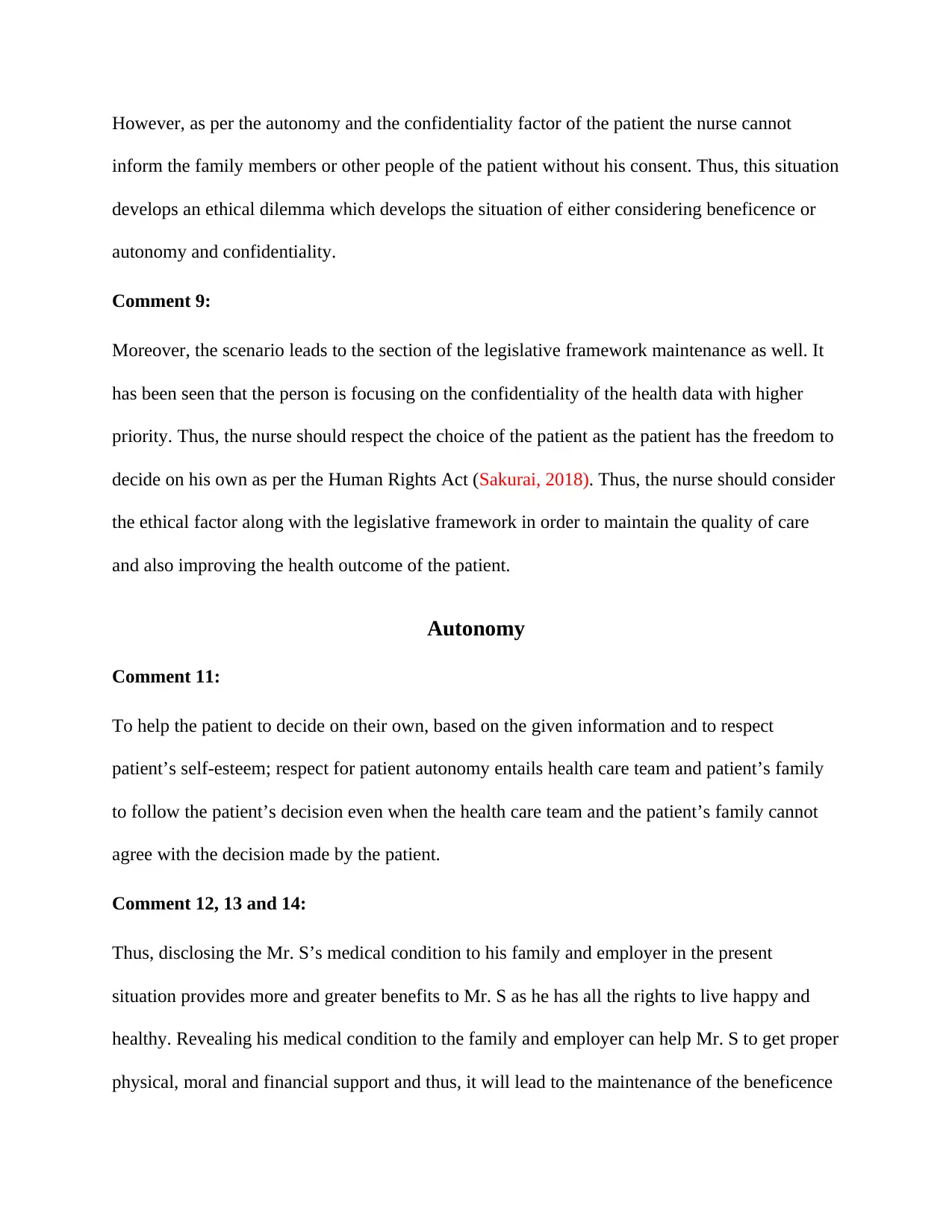
However, as per the autonomy and the confidentiality factor of the patient the nurse cannot
inform the family members or other people of the patient without his consent. Thus, this situation
develops an ethical dilemma which develops the situation of either considering beneficence or
autonomy and confidentiality.
Comment 9:
Moreover, the scenario leads to the section of the legislative framework maintenance as well. It
has been seen that the person is focusing on the confidentiality of the health data with higher
priority. Thus, the nurse should respect the choice of the patient as the patient has the freedom to
decide on his own as per the Human Rights Act (Sakurai, 2018). Thus, the nurse should consider
the ethical factor along with the legislative framework in order to maintain the quality of care
and also improving the health outcome of the patient.
Autonomy
Comment 11:
To help the patient to decide on their own, based on the given information and to respect
patient’s self-esteem; respect for patient autonomy entails health care team and patient’s family
to follow the patient’s decision even when the health care team and the patient’s family cannot
agree with the decision made by the patient.
Comment 12, 13 and 14:
Thus, disclosing the Mr. S’s medical condition to his family and employer in the present
situation provides more and greater benefits to Mr. S as he has all the rights to live happy and
healthy. Revealing his medical condition to the family and employer can help Mr. S to get proper
physical, moral and financial support and thus, it will lead to the maintenance of the beneficence
inform the family members or other people of the patient without his consent. Thus, this situation
develops an ethical dilemma which develops the situation of either considering beneficence or
autonomy and confidentiality.
Comment 9:
Moreover, the scenario leads to the section of the legislative framework maintenance as well. It
has been seen that the person is focusing on the confidentiality of the health data with higher
priority. Thus, the nurse should respect the choice of the patient as the patient has the freedom to
decide on his own as per the Human Rights Act (Sakurai, 2018). Thus, the nurse should consider
the ethical factor along with the legislative framework in order to maintain the quality of care
and also improving the health outcome of the patient.
Autonomy
Comment 11:
To help the patient to decide on their own, based on the given information and to respect
patient’s self-esteem; respect for patient autonomy entails health care team and patient’s family
to follow the patient’s decision even when the health care team and the patient’s family cannot
agree with the decision made by the patient.
Comment 12, 13 and 14:
Thus, disclosing the Mr. S’s medical condition to his family and employer in the present
situation provides more and greater benefits to Mr. S as he has all the rights to live happy and
healthy. Revealing his medical condition to the family and employer can help Mr. S to get proper
physical, moral and financial support and thus, it will lead to the maintenance of the beneficence
⊘ This is a preview!⊘
Do you want full access?
Subscribe today to unlock all pages.

Trusted by 1+ million students worldwide
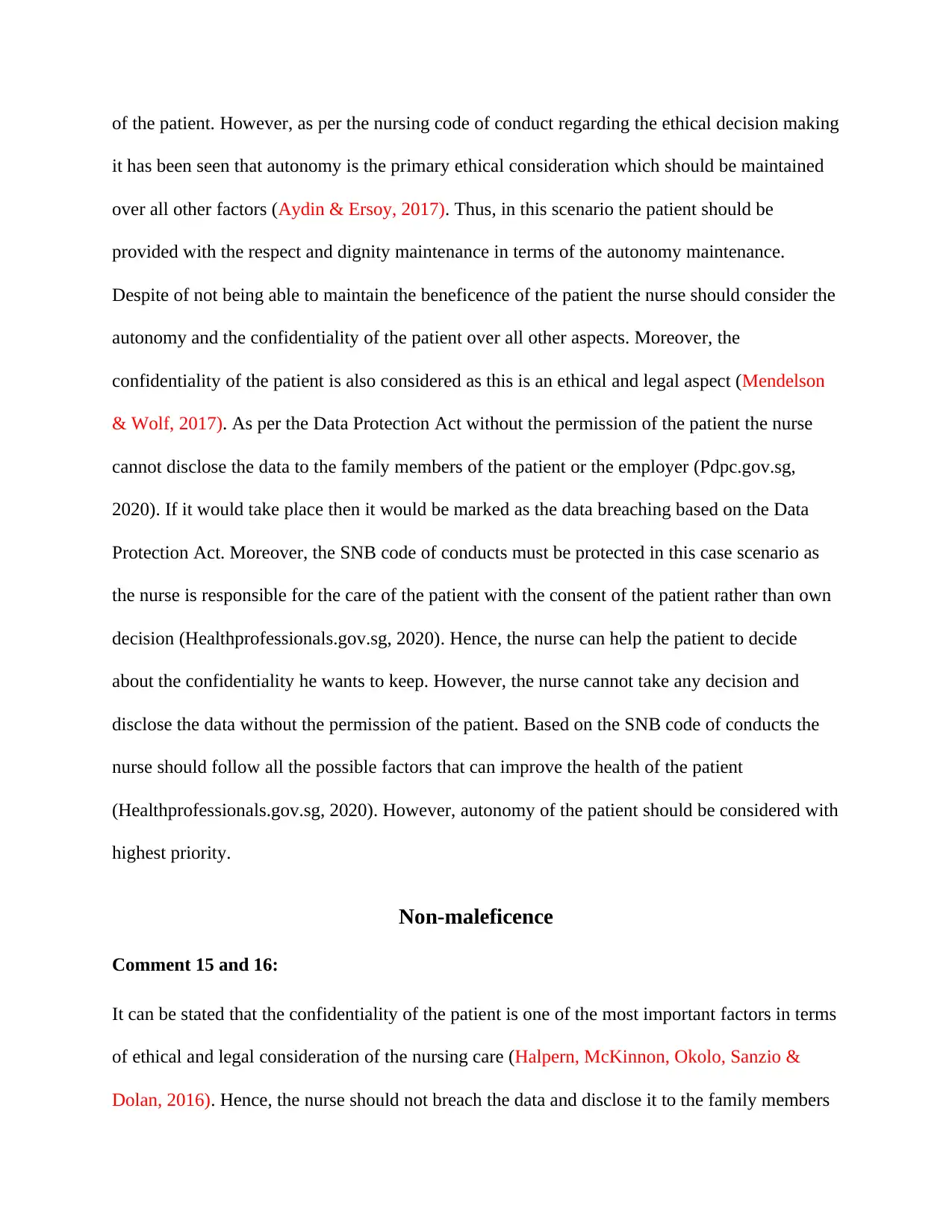
of the patient. However, as per the nursing code of conduct regarding the ethical decision making
it has been seen that autonomy is the primary ethical consideration which should be maintained
over all other factors (Aydin & Ersoy, 2017). Thus, in this scenario the patient should be
provided with the respect and dignity maintenance in terms of the autonomy maintenance.
Despite of not being able to maintain the beneficence of the patient the nurse should consider the
autonomy and the confidentiality of the patient over all other aspects. Moreover, the
confidentiality of the patient is also considered as this is an ethical and legal aspect (Mendelson
& Wolf, 2017). As per the Data Protection Act without the permission of the patient the nurse
cannot disclose the data to the family members of the patient or the employer (Pdpc.gov.sg,
2020). If it would take place then it would be marked as the data breaching based on the Data
Protection Act. Moreover, the SNB code of conducts must be protected in this case scenario as
the nurse is responsible for the care of the patient with the consent of the patient rather than own
decision (Healthprofessionals.gov.sg, 2020). Hence, the nurse can help the patient to decide
about the confidentiality he wants to keep. However, the nurse cannot take any decision and
disclose the data without the permission of the patient. Based on the SNB code of conducts the
nurse should follow all the possible factors that can improve the health of the patient
(Healthprofessionals.gov.sg, 2020). However, autonomy of the patient should be considered with
highest priority.
Non-maleficence
Comment 15 and 16:
It can be stated that the confidentiality of the patient is one of the most important factors in terms
of ethical and legal consideration of the nursing care (Halpern, McKinnon, Okolo, Sanzio &
Dolan, 2016). Hence, the nurse should not breach the data and disclose it to the family members
it has been seen that autonomy is the primary ethical consideration which should be maintained
over all other factors (Aydin & Ersoy, 2017). Thus, in this scenario the patient should be
provided with the respect and dignity maintenance in terms of the autonomy maintenance.
Despite of not being able to maintain the beneficence of the patient the nurse should consider the
autonomy and the confidentiality of the patient over all other aspects. Moreover, the
confidentiality of the patient is also considered as this is an ethical and legal aspect (Mendelson
& Wolf, 2017). As per the Data Protection Act without the permission of the patient the nurse
cannot disclose the data to the family members of the patient or the employer (Pdpc.gov.sg,
2020). If it would take place then it would be marked as the data breaching based on the Data
Protection Act. Moreover, the SNB code of conducts must be protected in this case scenario as
the nurse is responsible for the care of the patient with the consent of the patient rather than own
decision (Healthprofessionals.gov.sg, 2020). Hence, the nurse can help the patient to decide
about the confidentiality he wants to keep. However, the nurse cannot take any decision and
disclose the data without the permission of the patient. Based on the SNB code of conducts the
nurse should follow all the possible factors that can improve the health of the patient
(Healthprofessionals.gov.sg, 2020). However, autonomy of the patient should be considered with
highest priority.
Non-maleficence
Comment 15 and 16:
It can be stated that the confidentiality of the patient is one of the most important factors in terms
of ethical and legal consideration of the nursing care (Halpern, McKinnon, Okolo, Sanzio &
Dolan, 2016). Hence, the nurse should not breach the data and disclose it to the family members
Paraphrase This Document
Need a fresh take? Get an instant paraphrase of this document with our AI Paraphraser
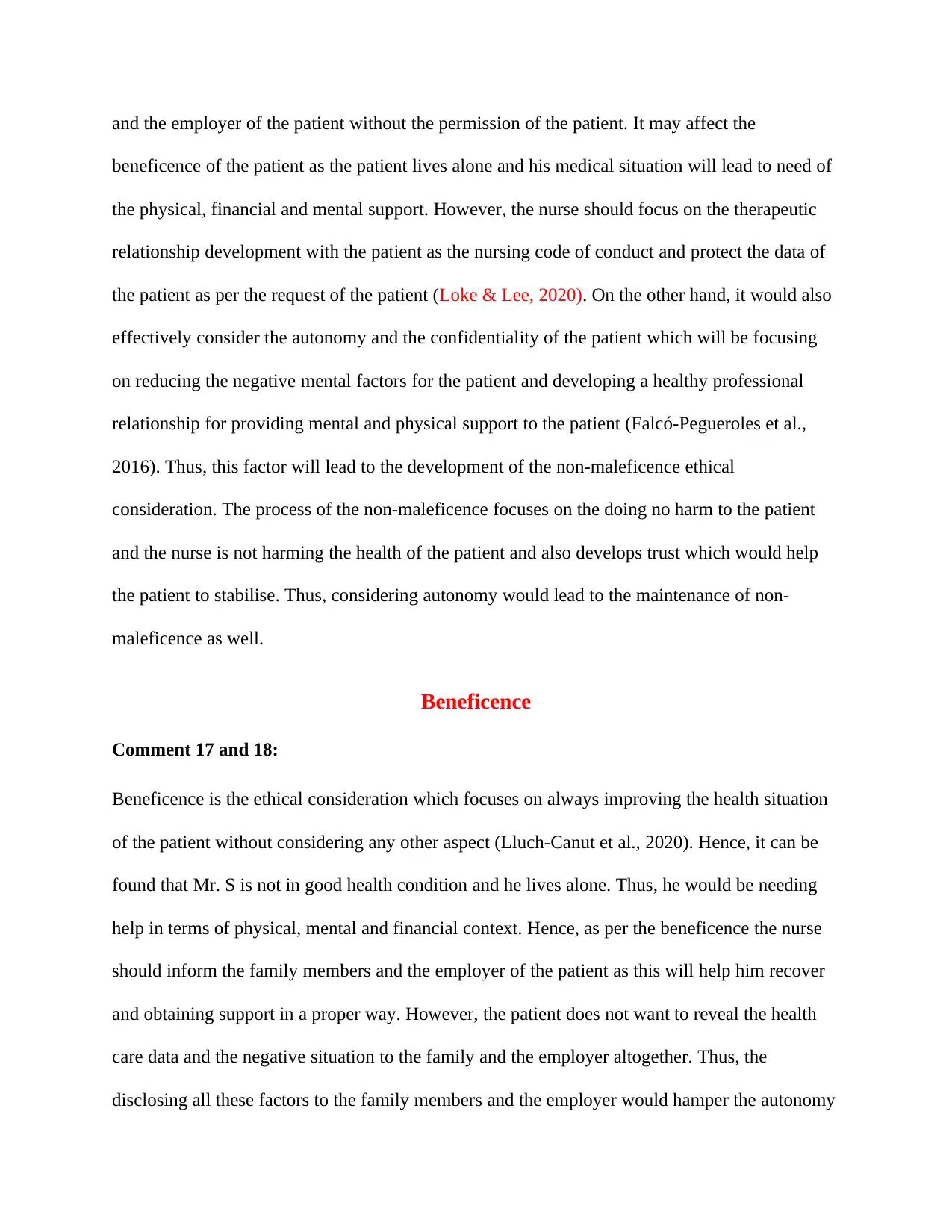
and the employer of the patient without the permission of the patient. It may affect the
beneficence of the patient as the patient lives alone and his medical situation will lead to need of
the physical, financial and mental support. However, the nurse should focus on the therapeutic
relationship development with the patient as the nursing code of conduct and protect the data of
the patient as per the request of the patient (Loke & Lee, 2020). On the other hand, it would also
effectively consider the autonomy and the confidentiality of the patient which will be focusing
on reducing the negative mental factors for the patient and developing a healthy professional
relationship for providing mental and physical support to the patient (Falcó-Pegueroles et al.,
2016). Thus, this factor will lead to the development of the non-maleficence ethical
consideration. The process of the non-maleficence focuses on the doing no harm to the patient
and the nurse is not harming the health of the patient and also develops trust which would help
the patient to stabilise. Thus, considering autonomy would lead to the maintenance of non-
maleficence as well.
Beneficence
Comment 17 and 18:
Beneficence is the ethical consideration which focuses on always improving the health situation
of the patient without considering any other aspect (Lluch-Canut et al., 2020). Hence, it can be
found that Mr. S is not in good health condition and he lives alone. Thus, he would be needing
help in terms of physical, mental and financial context. Hence, as per the beneficence the nurse
should inform the family members and the employer of the patient as this will help him recover
and obtaining support in a proper way. However, the patient does not want to reveal the health
care data and the negative situation to the family and the employer altogether. Thus, the
disclosing all these factors to the family members and the employer would hamper the autonomy
beneficence of the patient as the patient lives alone and his medical situation will lead to need of
the physical, financial and mental support. However, the nurse should focus on the therapeutic
relationship development with the patient as the nursing code of conduct and protect the data of
the patient as per the request of the patient (Loke & Lee, 2020). On the other hand, it would also
effectively consider the autonomy and the confidentiality of the patient which will be focusing
on reducing the negative mental factors for the patient and developing a healthy professional
relationship for providing mental and physical support to the patient (Falcó-Pegueroles et al.,
2016). Thus, this factor will lead to the development of the non-maleficence ethical
consideration. The process of the non-maleficence focuses on the doing no harm to the patient
and the nurse is not harming the health of the patient and also develops trust which would help
the patient to stabilise. Thus, considering autonomy would lead to the maintenance of non-
maleficence as well.
Beneficence
Comment 17 and 18:
Beneficence is the ethical consideration which focuses on always improving the health situation
of the patient without considering any other aspect (Lluch-Canut et al., 2020). Hence, it can be
found that Mr. S is not in good health condition and he lives alone. Thus, he would be needing
help in terms of physical, mental and financial context. Hence, as per the beneficence the nurse
should inform the family members and the employer of the patient as this will help him recover
and obtaining support in a proper way. However, the patient does not want to reveal the health
care data and the negative situation to the family and the employer altogether. Thus, the
disclosing all these factors to the family members and the employer would hamper the autonomy
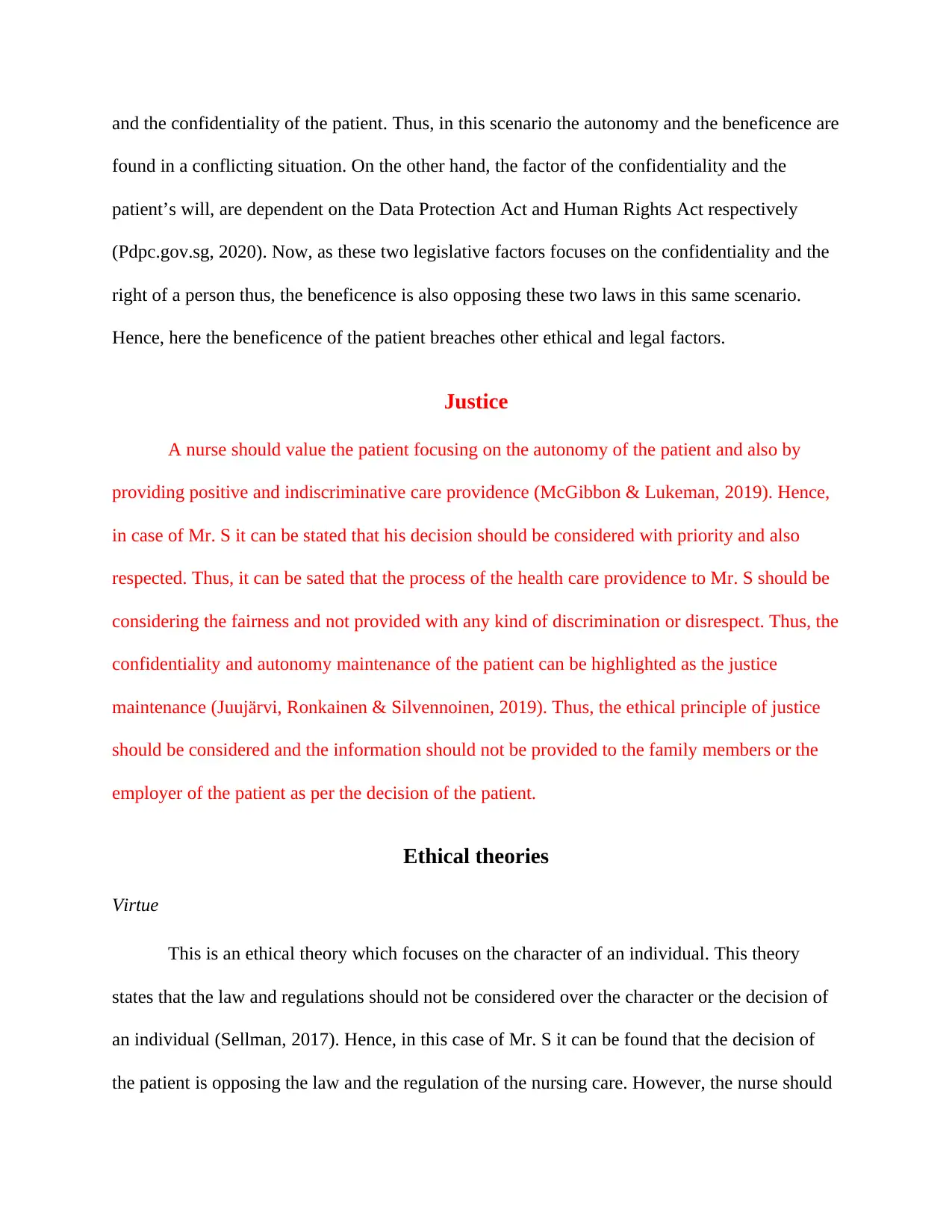
and the confidentiality of the patient. Thus, in this scenario the autonomy and the beneficence are
found in a conflicting situation. On the other hand, the factor of the confidentiality and the
patient’s will, are dependent on the Data Protection Act and Human Rights Act respectively
(Pdpc.gov.sg, 2020). Now, as these two legislative factors focuses on the confidentiality and the
right of a person thus, the beneficence is also opposing these two laws in this same scenario.
Hence, here the beneficence of the patient breaches other ethical and legal factors.
Justice
A nurse should value the patient focusing on the autonomy of the patient and also by
providing positive and indiscriminative care providence (McGibbon & Lukeman, 2019). Hence,
in case of Mr. S it can be stated that his decision should be considered with priority and also
respected. Thus, it can be sated that the process of the health care providence to Mr. S should be
considering the fairness and not provided with any kind of discrimination or disrespect. Thus, the
confidentiality and autonomy maintenance of the patient can be highlighted as the justice
maintenance (Juujärvi, Ronkainen & Silvennoinen, 2019). Thus, the ethical principle of justice
should be considered and the information should not be provided to the family members or the
employer of the patient as per the decision of the patient.
Ethical theories
Virtue
This is an ethical theory which focuses on the character of an individual. This theory
states that the law and regulations should not be considered over the character or the decision of
an individual (Sellman, 2017). Hence, in this case of Mr. S it can be found that the decision of
the patient is opposing the law and the regulation of the nursing care. However, the nurse should
found in a conflicting situation. On the other hand, the factor of the confidentiality and the
patient’s will, are dependent on the Data Protection Act and Human Rights Act respectively
(Pdpc.gov.sg, 2020). Now, as these two legislative factors focuses on the confidentiality and the
right of a person thus, the beneficence is also opposing these two laws in this same scenario.
Hence, here the beneficence of the patient breaches other ethical and legal factors.
Justice
A nurse should value the patient focusing on the autonomy of the patient and also by
providing positive and indiscriminative care providence (McGibbon & Lukeman, 2019). Hence,
in case of Mr. S it can be stated that his decision should be considered with priority and also
respected. Thus, it can be sated that the process of the health care providence to Mr. S should be
considering the fairness and not provided with any kind of discrimination or disrespect. Thus, the
confidentiality and autonomy maintenance of the patient can be highlighted as the justice
maintenance (Juujärvi, Ronkainen & Silvennoinen, 2019). Thus, the ethical principle of justice
should be considered and the information should not be provided to the family members or the
employer of the patient as per the decision of the patient.
Ethical theories
Virtue
This is an ethical theory which focuses on the character of an individual. This theory
states that the law and regulations should not be considered over the character or the decision of
an individual (Sellman, 2017). Hence, in this case of Mr. S it can be found that the decision of
the patient is opposing the law and the regulation of the nursing care. However, the nurse should
⊘ This is a preview!⊘
Do you want full access?
Subscribe today to unlock all pages.

Trusted by 1+ million students worldwide
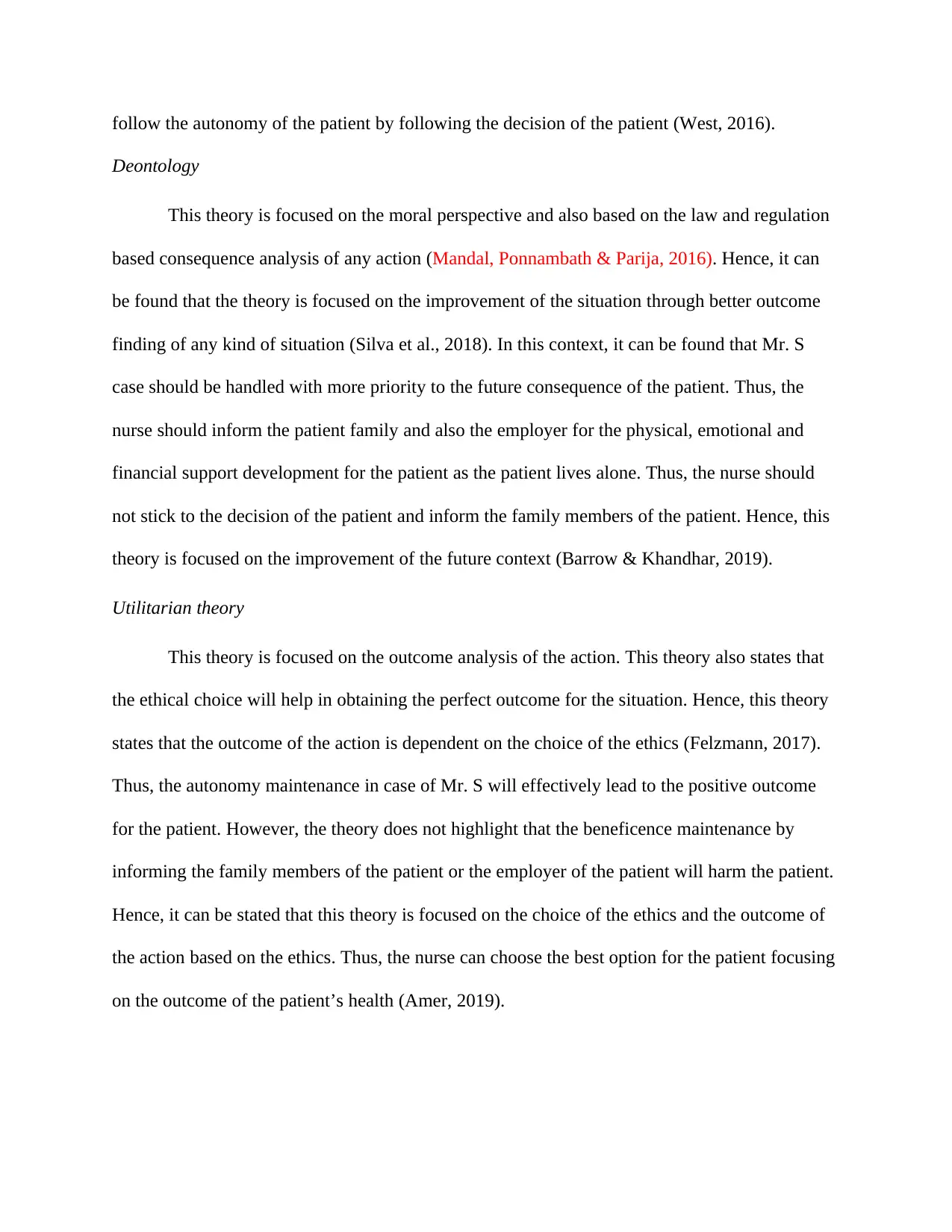
follow the autonomy of the patient by following the decision of the patient (West, 2016).
Deontology
This theory is focused on the moral perspective and also based on the law and regulation
based consequence analysis of any action (Mandal, Ponnambath & Parija, 2016). Hence, it can
be found that the theory is focused on the improvement of the situation through better outcome
finding of any kind of situation (Silva et al., 2018). In this context, it can be found that Mr. S
case should be handled with more priority to the future consequence of the patient. Thus, the
nurse should inform the patient family and also the employer for the physical, emotional and
financial support development for the patient as the patient lives alone. Thus, the nurse should
not stick to the decision of the patient and inform the family members of the patient. Hence, this
theory is focused on the improvement of the future context (Barrow & Khandhar, 2019).
Utilitarian theory
This theory is focused on the outcome analysis of the action. This theory also states that
the ethical choice will help in obtaining the perfect outcome for the situation. Hence, this theory
states that the outcome of the action is dependent on the choice of the ethics (Felzmann, 2017).
Thus, the autonomy maintenance in case of Mr. S will effectively lead to the positive outcome
for the patient. However, the theory does not highlight that the beneficence maintenance by
informing the family members of the patient or the employer of the patient will harm the patient.
Hence, it can be stated that this theory is focused on the choice of the ethics and the outcome of
the action based on the ethics. Thus, the nurse can choose the best option for the patient focusing
on the outcome of the patient’s health (Amer, 2019).
Deontology
This theory is focused on the moral perspective and also based on the law and regulation
based consequence analysis of any action (Mandal, Ponnambath & Parija, 2016). Hence, it can
be found that the theory is focused on the improvement of the situation through better outcome
finding of any kind of situation (Silva et al., 2018). In this context, it can be found that Mr. S
case should be handled with more priority to the future consequence of the patient. Thus, the
nurse should inform the patient family and also the employer for the physical, emotional and
financial support development for the patient as the patient lives alone. Thus, the nurse should
not stick to the decision of the patient and inform the family members of the patient. Hence, this
theory is focused on the improvement of the future context (Barrow & Khandhar, 2019).
Utilitarian theory
This theory is focused on the outcome analysis of the action. This theory also states that
the ethical choice will help in obtaining the perfect outcome for the situation. Hence, this theory
states that the outcome of the action is dependent on the choice of the ethics (Felzmann, 2017).
Thus, the autonomy maintenance in case of Mr. S will effectively lead to the positive outcome
for the patient. However, the theory does not highlight that the beneficence maintenance by
informing the family members of the patient or the employer of the patient will harm the patient.
Hence, it can be stated that this theory is focused on the choice of the ethics and the outcome of
the action based on the ethics. Thus, the nurse can choose the best option for the patient focusing
on the outcome of the patient’s health (Amer, 2019).
Paraphrase This Document
Need a fresh take? Get an instant paraphrase of this document with our AI Paraphraser
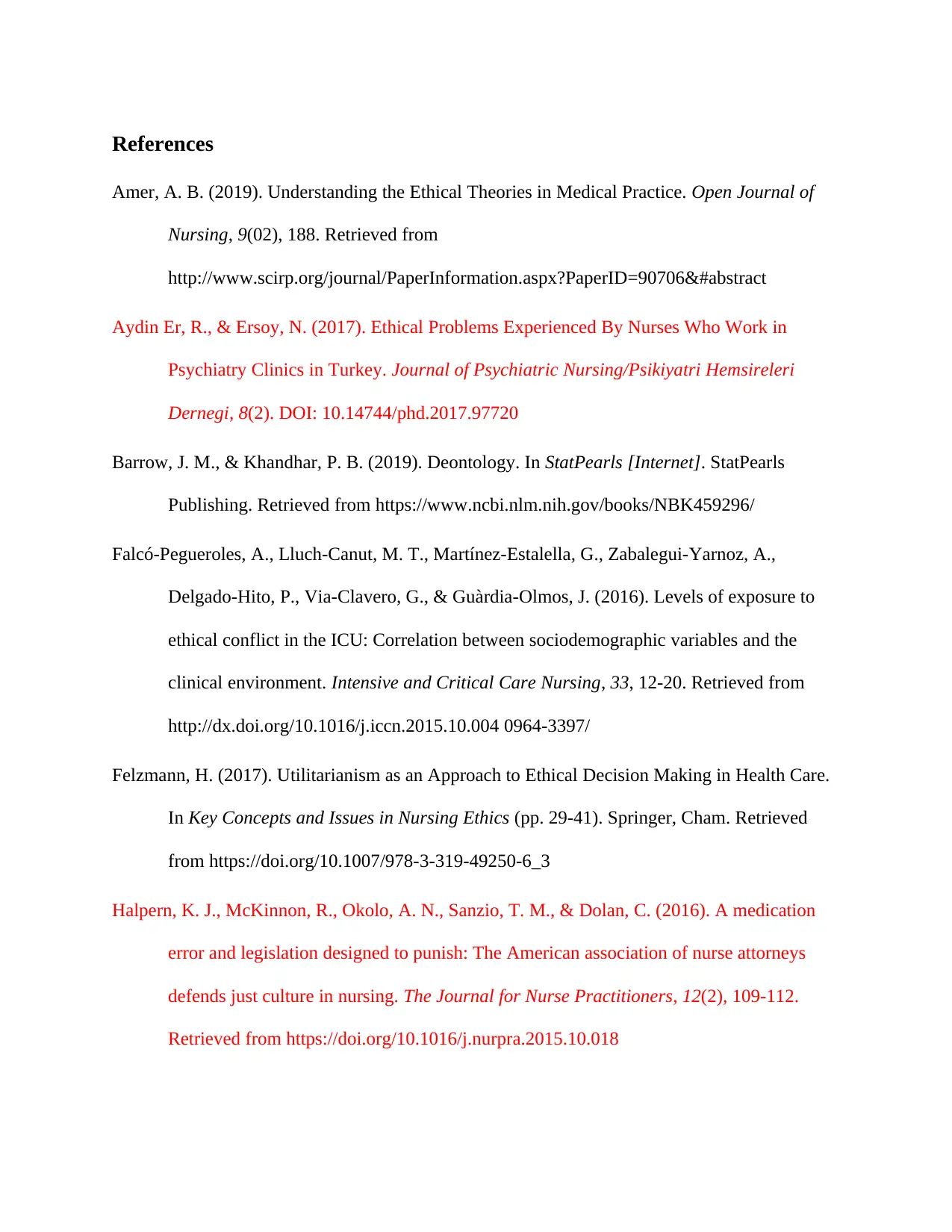
References
Amer, A. B. (2019). Understanding the Ethical Theories in Medical Practice. Open Journal of
Nursing, 9(02), 188. Retrieved from
http://www.scirp.org/journal/PaperInformation.aspx?PaperID=90706&#abstract
Aydin Er, R., & Ersoy, N. (2017). Ethical Problems Experienced By Nurses Who Work in
Psychiatry Clinics in Turkey. Journal of Psychiatric Nursing/Psikiyatri Hemsireleri
Dernegi, 8(2). DOI: 10.14744/phd.2017.97720
Barrow, J. M., & Khandhar, P. B. (2019). Deontology. In StatPearls [Internet]. StatPearls
Publishing. Retrieved from https://www.ncbi.nlm.nih.gov/books/NBK459296/
Falcó-Pegueroles, A., Lluch-Canut, M. T., Martínez-Estalella, G., Zabalegui-Yarnoz, A.,
Delgado-Hito, P., Via-Clavero, G., & Guàrdia-Olmos, J. (2016). Levels of exposure to
ethical conflict in the ICU: Correlation between sociodemographic variables and the
clinical environment. Intensive and Critical Care Nursing, 33, 12-20. Retrieved from
http://dx.doi.org/10.1016/j.iccn.2015.10.004 0964-3397/
Felzmann, H. (2017). Utilitarianism as an Approach to Ethical Decision Making in Health Care.
In Key Concepts and Issues in Nursing Ethics (pp. 29-41). Springer, Cham. Retrieved
from https://doi.org/10.1007/978-3-319-49250-6_3
Halpern, K. J., McKinnon, R., Okolo, A. N., Sanzio, T. M., & Dolan, C. (2016). A medication
error and legislation designed to punish: The American association of nurse attorneys
defends just culture in nursing. The Journal for Nurse Practitioners, 12(2), 109-112.
Retrieved from https://doi.org/10.1016/j.nurpra.2015.10.018
Amer, A. B. (2019). Understanding the Ethical Theories in Medical Practice. Open Journal of
Nursing, 9(02), 188. Retrieved from
http://www.scirp.org/journal/PaperInformation.aspx?PaperID=90706&#abstract
Aydin Er, R., & Ersoy, N. (2017). Ethical Problems Experienced By Nurses Who Work in
Psychiatry Clinics in Turkey. Journal of Psychiatric Nursing/Psikiyatri Hemsireleri
Dernegi, 8(2). DOI: 10.14744/phd.2017.97720
Barrow, J. M., & Khandhar, P. B. (2019). Deontology. In StatPearls [Internet]. StatPearls
Publishing. Retrieved from https://www.ncbi.nlm.nih.gov/books/NBK459296/
Falcó-Pegueroles, A., Lluch-Canut, M. T., Martínez-Estalella, G., Zabalegui-Yarnoz, A.,
Delgado-Hito, P., Via-Clavero, G., & Guàrdia-Olmos, J. (2016). Levels of exposure to
ethical conflict in the ICU: Correlation between sociodemographic variables and the
clinical environment. Intensive and Critical Care Nursing, 33, 12-20. Retrieved from
http://dx.doi.org/10.1016/j.iccn.2015.10.004 0964-3397/
Felzmann, H. (2017). Utilitarianism as an Approach to Ethical Decision Making in Health Care.
In Key Concepts and Issues in Nursing Ethics (pp. 29-41). Springer, Cham. Retrieved
from https://doi.org/10.1007/978-3-319-49250-6_3
Halpern, K. J., McKinnon, R., Okolo, A. N., Sanzio, T. M., & Dolan, C. (2016). A medication
error and legislation designed to punish: The American association of nurse attorneys
defends just culture in nursing. The Journal for Nurse Practitioners, 12(2), 109-112.
Retrieved from https://doi.org/10.1016/j.nurpra.2015.10.018
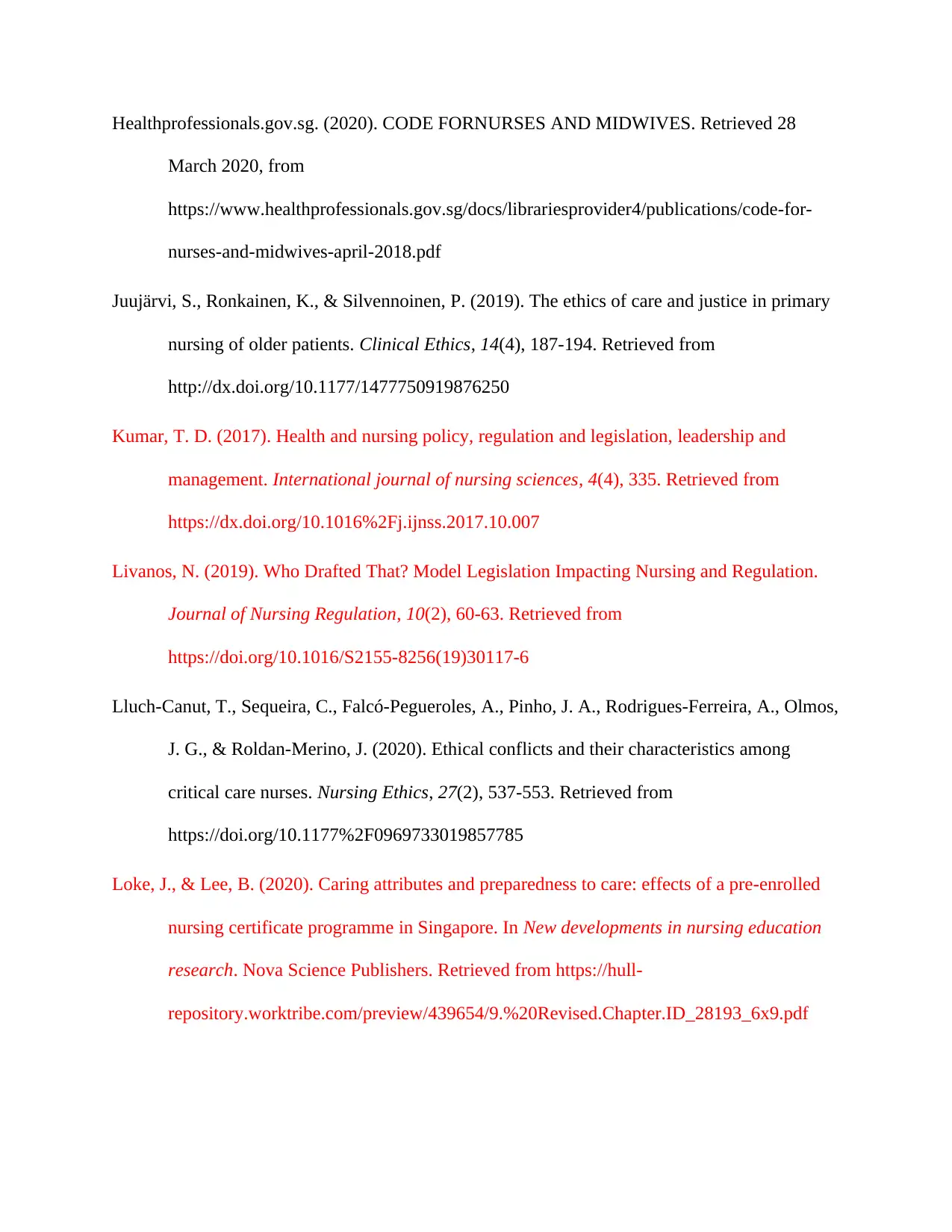
Healthprofessionals.gov.sg. (2020). CODE FORNURSES AND MIDWIVES. Retrieved 28
March 2020, from
https://www.healthprofessionals.gov.sg/docs/librariesprovider4/publications/code-for-
nurses-and-midwives-april-2018.pdf
Juujärvi, S., Ronkainen, K., & Silvennoinen, P. (2019). The ethics of care and justice in primary
nursing of older patients. Clinical Ethics, 14(4), 187-194. Retrieved from
http://dx.doi.org/10.1177/1477750919876250
Kumar, T. D. (2017). Health and nursing policy, regulation and legislation, leadership and
management. International journal of nursing sciences, 4(4), 335. Retrieved from
https://dx.doi.org/10.1016%2Fj.ijnss.2017.10.007
Livanos, N. (2019). Who Drafted That? Model Legislation Impacting Nursing and Regulation.
Journal of Nursing Regulation, 10(2), 60-63. Retrieved from
https://doi.org/10.1016/S2155-8256(19)30117-6
Lluch-Canut, T., Sequeira, C., Falcó-Pegueroles, A., Pinho, J. A., Rodrigues-Ferreira, A., Olmos,
J. G., & Roldan-Merino, J. (2020). Ethical conflicts and their characteristics among
critical care nurses. Nursing Ethics, 27(2), 537-553. Retrieved from
https://doi.org/10.1177%2F0969733019857785
Loke, J., & Lee, B. (2020). Caring attributes and preparedness to care: effects of a pre-enrolled
nursing certificate programme in Singapore. In New developments in nursing education
research. Nova Science Publishers. Retrieved from https://hull-
repository.worktribe.com/preview/439654/9.%20Revised.Chapter.ID_28193_6x9.pdf
March 2020, from
https://www.healthprofessionals.gov.sg/docs/librariesprovider4/publications/code-for-
nurses-and-midwives-april-2018.pdf
Juujärvi, S., Ronkainen, K., & Silvennoinen, P. (2019). The ethics of care and justice in primary
nursing of older patients. Clinical Ethics, 14(4), 187-194. Retrieved from
http://dx.doi.org/10.1177/1477750919876250
Kumar, T. D. (2017). Health and nursing policy, regulation and legislation, leadership and
management. International journal of nursing sciences, 4(4), 335. Retrieved from
https://dx.doi.org/10.1016%2Fj.ijnss.2017.10.007
Livanos, N. (2019). Who Drafted That? Model Legislation Impacting Nursing and Regulation.
Journal of Nursing Regulation, 10(2), 60-63. Retrieved from
https://doi.org/10.1016/S2155-8256(19)30117-6
Lluch-Canut, T., Sequeira, C., Falcó-Pegueroles, A., Pinho, J. A., Rodrigues-Ferreira, A., Olmos,
J. G., & Roldan-Merino, J. (2020). Ethical conflicts and their characteristics among
critical care nurses. Nursing Ethics, 27(2), 537-553. Retrieved from
https://doi.org/10.1177%2F0969733019857785
Loke, J., & Lee, B. (2020). Caring attributes and preparedness to care: effects of a pre-enrolled
nursing certificate programme in Singapore. In New developments in nursing education
research. Nova Science Publishers. Retrieved from https://hull-
repository.worktribe.com/preview/439654/9.%20Revised.Chapter.ID_28193_6x9.pdf
⊘ This is a preview!⊘
Do you want full access?
Subscribe today to unlock all pages.

Trusted by 1+ million students worldwide
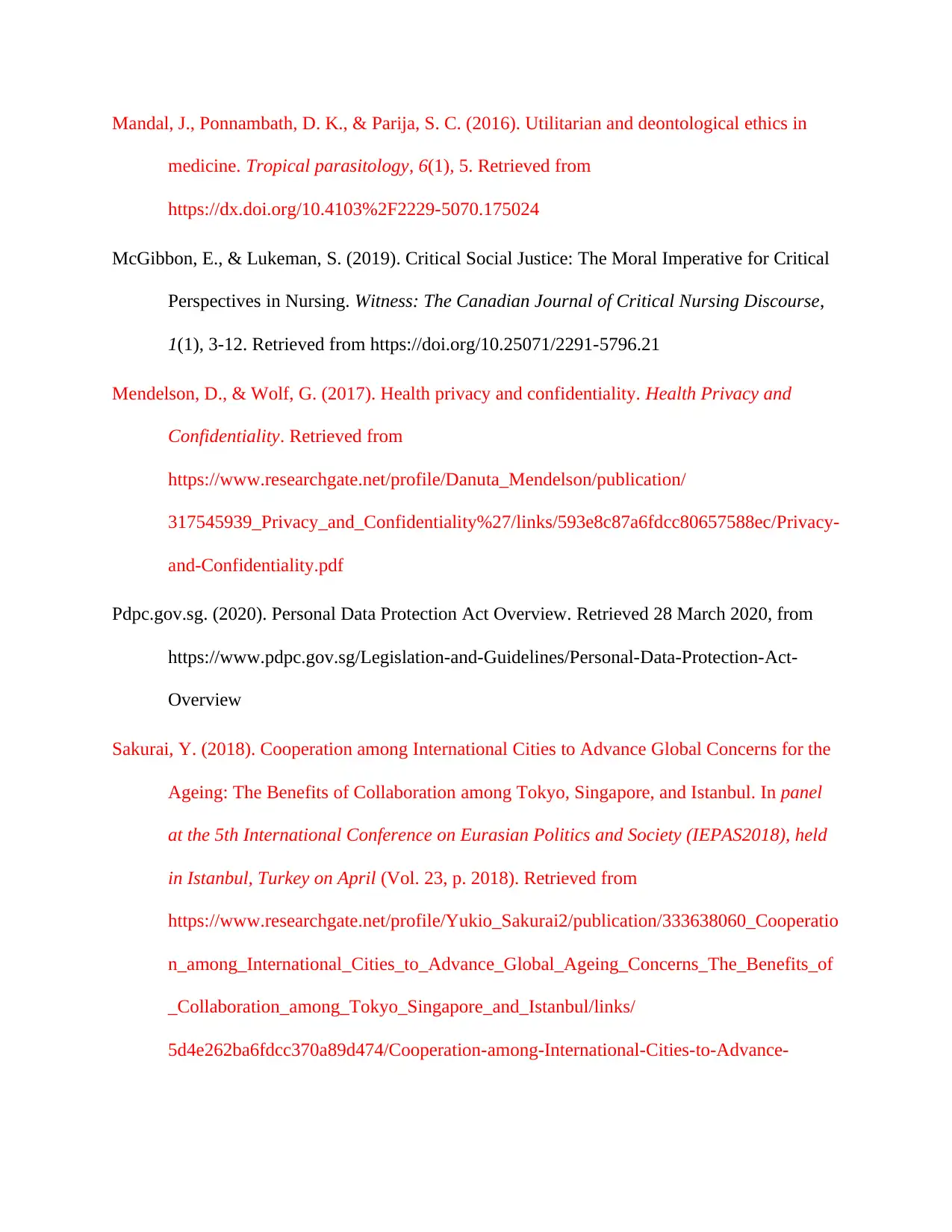
Mandal, J., Ponnambath, D. K., & Parija, S. C. (2016). Utilitarian and deontological ethics in
medicine. Tropical parasitology, 6(1), 5. Retrieved from
https://dx.doi.org/10.4103%2F2229-5070.175024
McGibbon, E., & Lukeman, S. (2019). Critical Social Justice: The Moral Imperative for Critical
Perspectives in Nursing. Witness: The Canadian Journal of Critical Nursing Discourse,
1(1), 3-12. Retrieved from https://doi.org/10.25071/2291-5796.21
Mendelson, D., & Wolf, G. (2017). Health privacy and confidentiality. Health Privacy and
Confidentiality. Retrieved from
https://www.researchgate.net/profile/Danuta_Mendelson/publication/
317545939_Privacy_and_Confidentiality%27/links/593e8c87a6fdcc80657588ec/Privacy-
and-Confidentiality.pdf
Pdpc.gov.sg. (2020). Personal Data Protection Act Overview. Retrieved 28 March 2020, from
https://www.pdpc.gov.sg/Legislation-and-Guidelines/Personal-Data-Protection-Act-
Overview
Sakurai, Y. (2018). Cooperation among International Cities to Advance Global Concerns for the
Ageing: The Benefits of Collaboration among Tokyo, Singapore, and Istanbul. In panel
at the 5th International Conference on Eurasian Politics and Society (IEPAS2018), held
in Istanbul, Turkey on April (Vol. 23, p. 2018). Retrieved from
https://www.researchgate.net/profile/Yukio_Sakurai2/publication/333638060_Cooperatio
n_among_International_Cities_to_Advance_Global_Ageing_Concerns_The_Benefits_of
_Collaboration_among_Tokyo_Singapore_and_Istanbul/links/
5d4e262ba6fdcc370a89d474/Cooperation-among-International-Cities-to-Advance-
medicine. Tropical parasitology, 6(1), 5. Retrieved from
https://dx.doi.org/10.4103%2F2229-5070.175024
McGibbon, E., & Lukeman, S. (2019). Critical Social Justice: The Moral Imperative for Critical
Perspectives in Nursing. Witness: The Canadian Journal of Critical Nursing Discourse,
1(1), 3-12. Retrieved from https://doi.org/10.25071/2291-5796.21
Mendelson, D., & Wolf, G. (2017). Health privacy and confidentiality. Health Privacy and
Confidentiality. Retrieved from
https://www.researchgate.net/profile/Danuta_Mendelson/publication/
317545939_Privacy_and_Confidentiality%27/links/593e8c87a6fdcc80657588ec/Privacy-
and-Confidentiality.pdf
Pdpc.gov.sg. (2020). Personal Data Protection Act Overview. Retrieved 28 March 2020, from
https://www.pdpc.gov.sg/Legislation-and-Guidelines/Personal-Data-Protection-Act-
Overview
Sakurai, Y. (2018). Cooperation among International Cities to Advance Global Concerns for the
Ageing: The Benefits of Collaboration among Tokyo, Singapore, and Istanbul. In panel
at the 5th International Conference on Eurasian Politics and Society (IEPAS2018), held
in Istanbul, Turkey on April (Vol. 23, p. 2018). Retrieved from
https://www.researchgate.net/profile/Yukio_Sakurai2/publication/333638060_Cooperatio
n_among_International_Cities_to_Advance_Global_Ageing_Concerns_The_Benefits_of
_Collaboration_among_Tokyo_Singapore_and_Istanbul/links/
5d4e262ba6fdcc370a89d474/Cooperation-among-International-Cities-to-Advance-
Paraphrase This Document
Need a fresh take? Get an instant paraphrase of this document with our AI Paraphraser
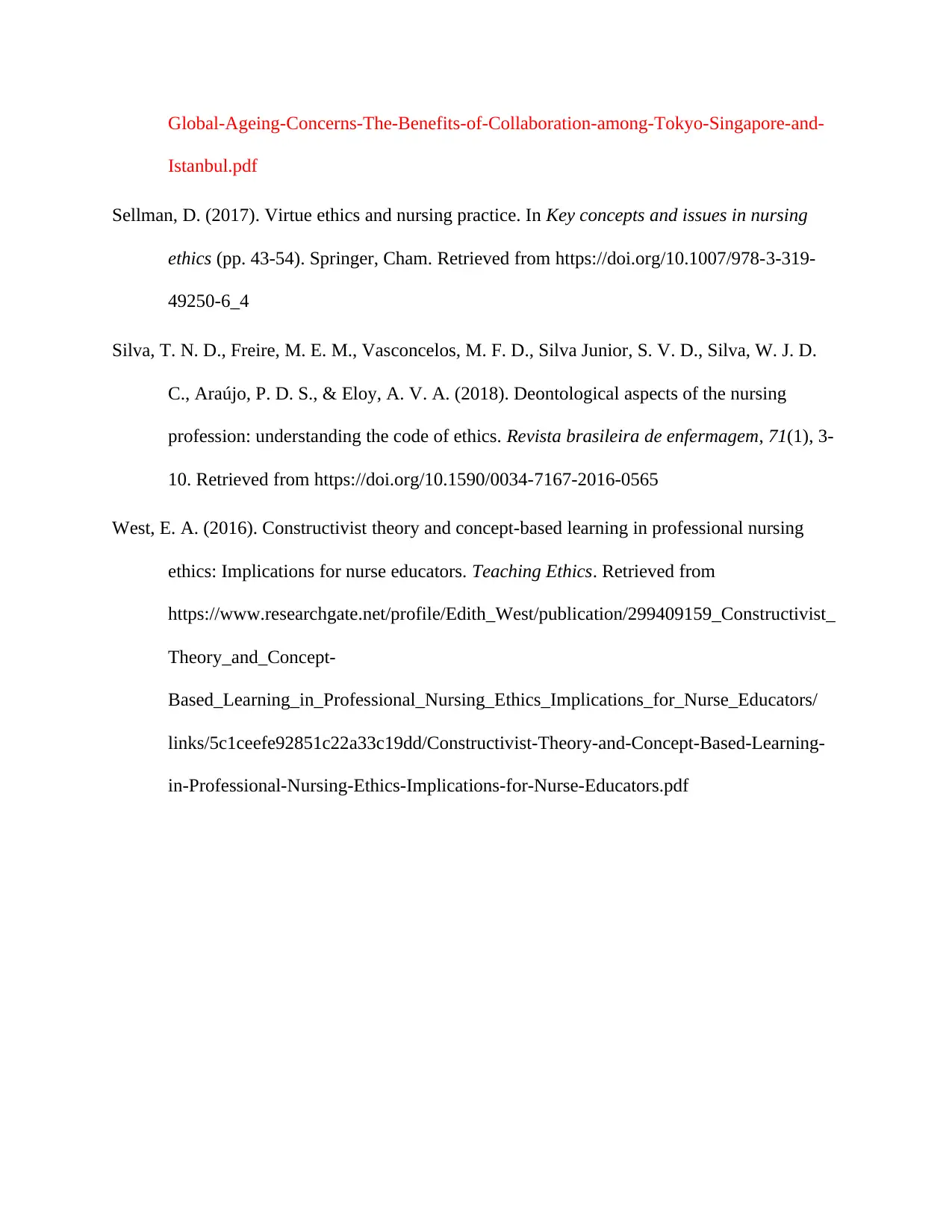
Global-Ageing-Concerns-The-Benefits-of-Collaboration-among-Tokyo-Singapore-and-
Istanbul.pdf
Sellman, D. (2017). Virtue ethics and nursing practice. In Key concepts and issues in nursing
ethics (pp. 43-54). Springer, Cham. Retrieved from https://doi.org/10.1007/978-3-319-
49250-6_4
Silva, T. N. D., Freire, M. E. M., Vasconcelos, M. F. D., Silva Junior, S. V. D., Silva, W. J. D.
C., Araújo, P. D. S., & Eloy, A. V. A. (2018). Deontological aspects of the nursing
profession: understanding the code of ethics. Revista brasileira de enfermagem, 71(1), 3-
10. Retrieved from https://doi.org/10.1590/0034-7167-2016-0565
West, E. A. (2016). Constructivist theory and concept-based learning in professional nursing
ethics: Implications for nurse educators. Teaching Ethics. Retrieved from
https://www.researchgate.net/profile/Edith_West/publication/299409159_Constructivist_
Theory_and_Concept-
Based_Learning_in_Professional_Nursing_Ethics_Implications_for_Nurse_Educators/
links/5c1ceefe92851c22a33c19dd/Constructivist-Theory-and-Concept-Based-Learning-
in-Professional-Nursing-Ethics-Implications-for-Nurse-Educators.pdf
Istanbul.pdf
Sellman, D. (2017). Virtue ethics and nursing practice. In Key concepts and issues in nursing
ethics (pp. 43-54). Springer, Cham. Retrieved from https://doi.org/10.1007/978-3-319-
49250-6_4
Silva, T. N. D., Freire, M. E. M., Vasconcelos, M. F. D., Silva Junior, S. V. D., Silva, W. J. D.
C., Araújo, P. D. S., & Eloy, A. V. A. (2018). Deontological aspects of the nursing
profession: understanding the code of ethics. Revista brasileira de enfermagem, 71(1), 3-
10. Retrieved from https://doi.org/10.1590/0034-7167-2016-0565
West, E. A. (2016). Constructivist theory and concept-based learning in professional nursing
ethics: Implications for nurse educators. Teaching Ethics. Retrieved from
https://www.researchgate.net/profile/Edith_West/publication/299409159_Constructivist_
Theory_and_Concept-
Based_Learning_in_Professional_Nursing_Ethics_Implications_for_Nurse_Educators/
links/5c1ceefe92851c22a33c19dd/Constructivist-Theory-and-Concept-Based-Learning-
in-Professional-Nursing-Ethics-Implications-for-Nurse-Educators.pdf

⊘ This is a preview!⊘
Do you want full access?
Subscribe today to unlock all pages.

Trusted by 1+ million students worldwide
1 out of 12
Related Documents
Your All-in-One AI-Powered Toolkit for Academic Success.
+13062052269
info@desklib.com
Available 24*7 on WhatsApp / Email
![[object Object]](/_next/static/media/star-bottom.7253800d.svg)
Unlock your academic potential
Copyright © 2020–2026 A2Z Services. All Rights Reserved. Developed and managed by ZUCOL.




